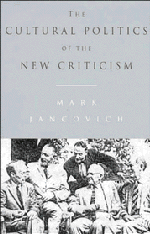Book contents
- Frontmatter
- Contents
- Preface
- List of abbreviations
- Part I The New Criticism and its critics
- Part II The formation of the New Criticism
- Part III The establishment of the New Criticism
- Part IV The development of the New Criticism
- Introduction
- 10 John Crowe Ransom: the isolation of aesthetic activity
- 11 Allen Tate: the man of letters and the cold war
- 12 Robert Penn Warren: literature and social engagement
- Conclusion: Modernism and postmodernism within the American academy
- Conclusion
- Notes
- Bibliography
- Index
10 - John Crowe Ransom: the isolation of aesthetic activity
Published online by Cambridge University Press: 18 December 2009
- Frontmatter
- Contents
- Preface
- List of abbreviations
- Part I The New Criticism and its critics
- Part II The formation of the New Criticism
- Part III The establishment of the New Criticism
- Part IV The development of the New Criticism
- Introduction
- 10 John Crowe Ransom: the isolation of aesthetic activity
- 11 Allen Tate: the man of letters and the cold war
- 12 Robert Penn Warren: literature and social engagement
- Conclusion: Modernism and postmodernism within the American academy
- Conclusion
- Notes
- Bibliography
- Index
Summary
Introduction
After 1941, Ransom's academic career was well established, and he continued to develop his defence of literary activity in opposition to the claims of scientific positivism. However, America's entry into World War II seriously affected this position. During the war, great demands were made of artistic and intellectual activities, both of which became intimately involved in the defence of ‘free culture’. Intellectuals became directly involved in the war effort, and began to identify American society with the cause of ‘cultural freedom’. Rather than acting as critics of their society, many intellectuals came to its defence either as actual combatants, or as its ideologues. The war also affected intellectual activity in other ways. It redirected financial resources so that universities and journals were forced to reconsider both their budgets and their activities. During this period, Ransom continued to define literature in opposition to scientific positivism and political action, but he also opposed its co-option to the war effort. Unfortunately, he began to isolate it from society. He found himself unable to oppose the war effort, and consequently, he found it harder and harder to justify his opposition to American society. After the war, he became resigned to the impossibility of restoring an aesthetic way of life, and as a result, his critical writings came to define literature as merely a parasitic or complementary activity which questioned the dominance of rationality, but which did not call for the creation of an alternative way of life. Finally, in 1945, Ransom announced that he no longer believed in either the possibility or the desirability of an Agrarian restoration. The aesthetic way of life became merely a necessary image. It was unobtainable in reality.
- Type
- Chapter
- Information
- The Cultural Politics of the New Criticism , pp. 105 - 113Publisher: Cambridge University PressPrint publication year: 1993



